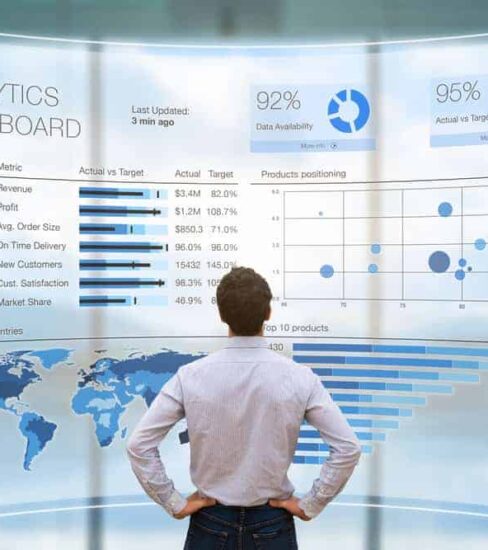The link between your ERP system and Business Intelligence, is pretty powerful. On one hand, an ERP system collects, stores organizes, and shares your operational business data, whereas, BI effectively analyzes your data to generate insights, so that you can make better-informed business decisions. Simply put, assessing the real added value of an ERP system, would be next to impossible without also focusing on the importance of your business intelligence, and how it single-handedly powers your operations.
Let’s take a closer look at the connection between business intelligence and ERP, and explore how ERP systems and BI are wired – effectively, intertwined, and why scaling your business largely depends on their combined use.
What is Business Intelligence?
Business Intelligence, or BI, was first introduced in the late 90s. The term was initially created by Howard Dresner, who defined its essence as a set of concepts and methods aimed at boosting business decision-making. In practical terms, Business Intelligence is a process of analyzing acquired business data. The process is lengthier than its definition and includes sub-processes, such as assessing the data and detailing it in a way that can best serve an organization’s short- and long-term business needs.
The purpose of analyzing data with the help of BI is to improve a business's performance and strategies, keep up with the latest market trends, and more importantly, be (at least) one step ahead of the competition. BI is also referred to as ‘knowledgeable management’ and is designed to generate useful and business-friendly datasets that would otherwise go unnoticed.
How Does ERP Support BI
For BI to be able to perform top-notch data analysis, it must manage both operational data and strategic data, while an ERP system is used to consolidate this data, a fundamental step prior to analyzing it. BI uses an OLAP, or Online Analytical Processing system chiefly focused on dashboard presentations and data reports. In comparison, ERP systems process online transactions, or OLTP (Online Transactional Processing), which enables them to modify and record all incoming transactions.
In terms of agility and performance, BI helps you define future outcomes through a wide range of functionalities, whereas ERP is in charge of the current optimization of all of your business activities.
ERP supports BI in 3 key areas:
Data Integration
ERP systems are data goldmines. With BI tools tapping into these reservoirs, businesses can derive insights based on a comprehensive dataset. Ensure your BI tools have direct access or APIs connecting to your ERP system for seamless data flow.
Real-time Analysis
Time is money, and with ERP's real-time data-feeding BI tools, businesses can make swift, informed decisions. Regularly update your ERP system and integrate it with BI tools that support real-time analytics.
Predictive Analytics
ERP provides the numbers, BI predicts the trends. This combination lets businesses foresee market shifts and adapt accordingly. You can train your BI tools using historical ERP data to refine its predictive capabilities.
Advantages of ERP and BI working together
Through the use of BI, you will successfully transform raw data into actionable information. BI enables businesses to learn more about the market and its customers, and generate metrics for necessary values, such as ROI. By using BI tools integrated into your ERP system, you will customize your product or service offering faster, enhance your brand loyalty, and in turn, grow your customer base.
ERP software and BI systems are not the same, but rather, collaborate to manage your data accordingly. It is their mutual task to convert all of your accumulated data into valuable insights and readily available, real-time business information, and ultimately, transform your brand into a scaling enterprise driven by targeted data.
While ERP systems organize your business information, BI technologies mine it, drill down into detail, and present it in a clear, coherent, and actionable format. In short, this means that BI and ERP are indispensable segments of your unique business story.
If your business is already relying on an ERP system to gather relevant data, you should be contemplating adding BI to the mix to further process, analyze, and use this data to power your operations. As a result, you’ll make better, smarter business decisions, from your factory floor – to your customer’s front door.
The Last Word
ERP software enables organizations of all sizes to run more efficiently, become more productive, and increase their bottom line, but it’s not powerful enough to do it alone. To maximize your ERP efficacy, you will also need to implement Business Intelligence. This way, you and your business will be primed and ready with valuable business insights, to aim for, and ultimately, achieve your goals.
If you would like to learn more about ERP system implementation, and the merits of Business Intelligence solutions, contact us to schedule a call with one of our ERP experts.


